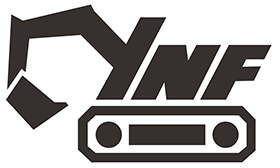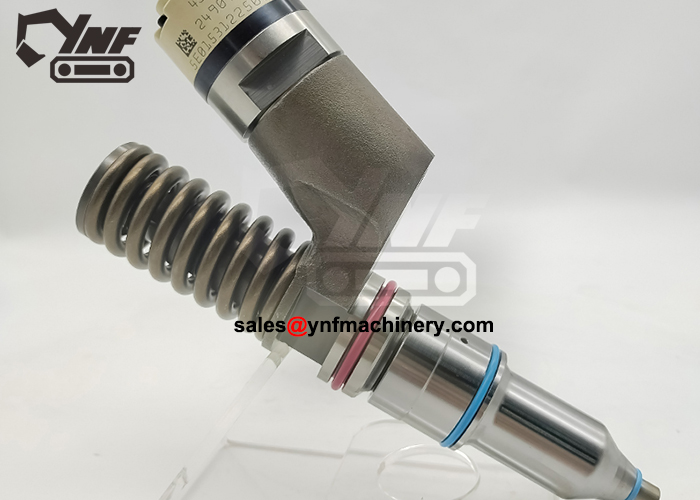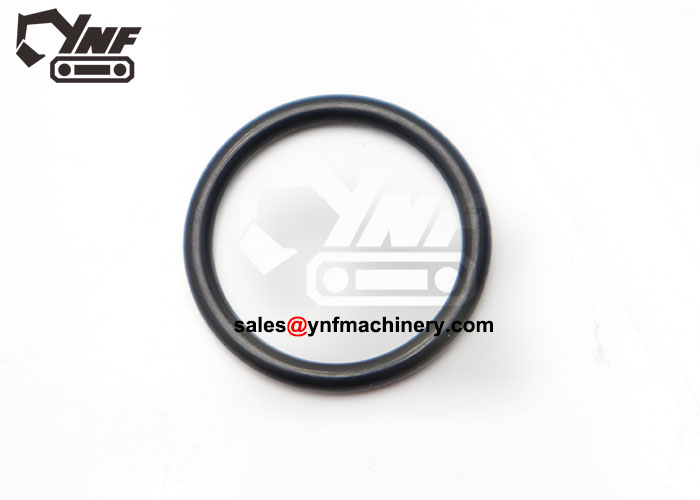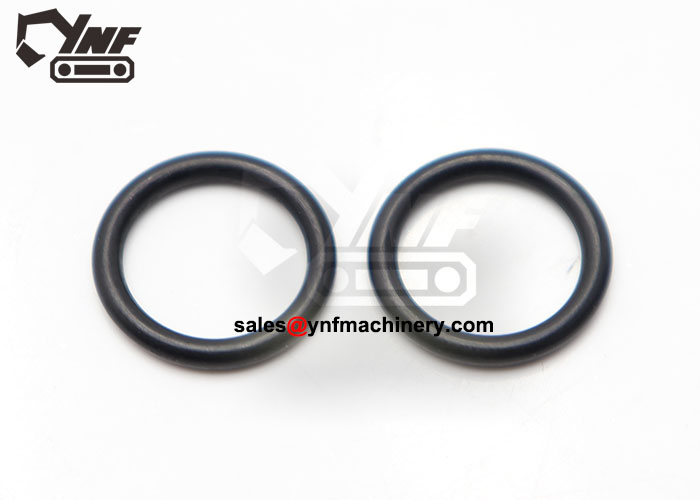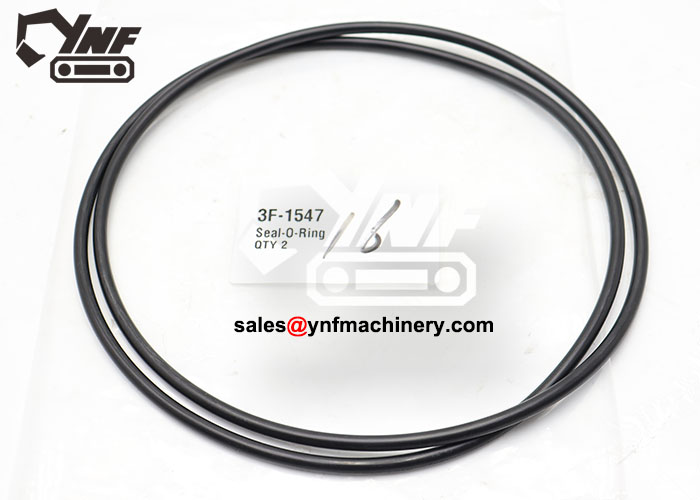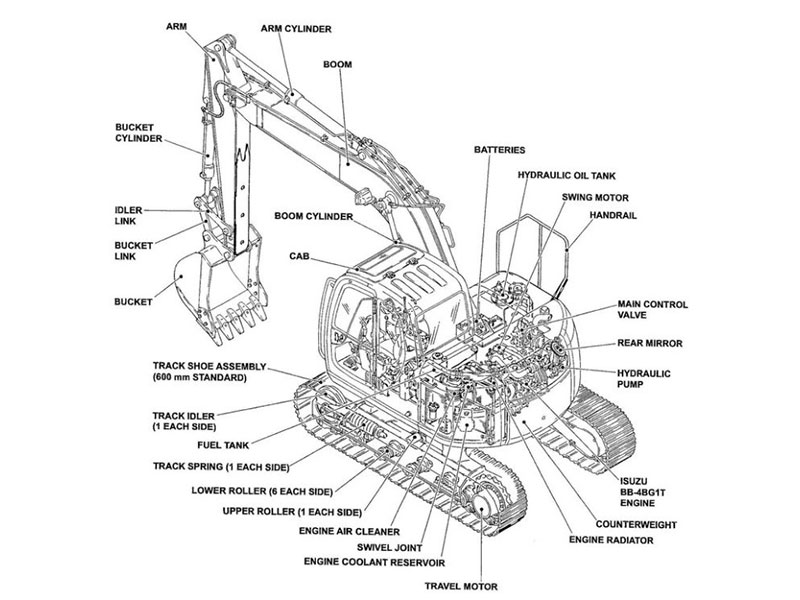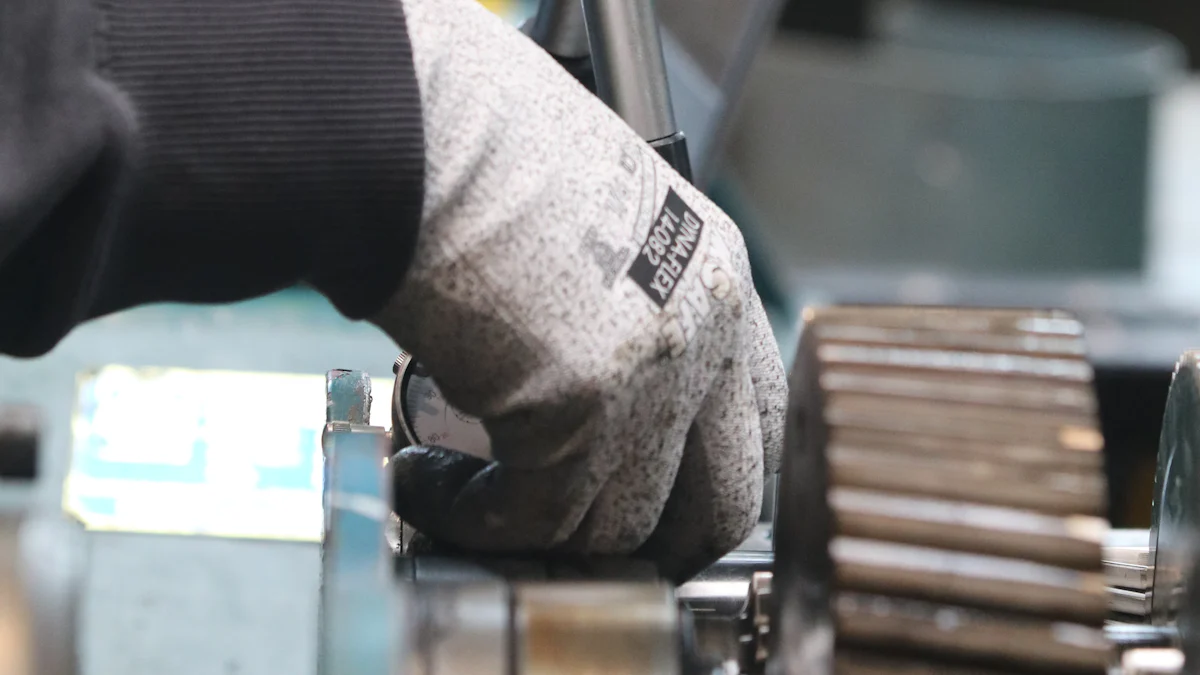
The Electronic Control Unit (ECU) plays a vital role in ensuring your excavator operates efficiently. It manages critical functions like engine performance, fuel efficiency, and emissions compliance. Regular excavator ECU repair and maintenance not only prevent unexpected breakdowns but also save you from costly repairs and downtime. Proactive care, such as routine checks and timely repairs, keeps your machine in top condition. By addressing issues early, you extend the lifespan of your equipment and maintain optimal performance. A well-maintained ECU ensures your excavator remains reliable and ready for any task.
Key Takeaways
Regular ECU maintenance prevents unexpected breakdowns and costly repairs, ensuring your excavator operates efficiently.
Understanding common ECU issues, such as faulty sensors and software glitches, allows for early detection and timely repairs.
Using the right diagnostic tools, like a diagnostic scanner and multimeter, is essential for accurately identifying ECU problems.
Implementing preventive maintenance practices, such as cleaning wiring connections and updating software, extends the lifespan of your ECU.
Seek professional help when persistent error codes appear or when complex software issues arise to avoid further damage.
Choosing high-quality parts and reliable suppliers, like YNF Machinery, ensures your repairs are effective and your excavator remains dependable.
Monitoring engine performance regularly helps catch potential ECU issues early, maintaining optimal efficiency and reducing downtime.
Understanding the Excavator ECU and Its Functions
What is an Excavator ECU?
The engine control unit (ECU) acts as the brain of your excavator. It processes data from various sensors and ensures that the machine operates efficiently. This small yet powerful device monitors and controls critical systems, such as the engine, fuel injection, and emissions. By interpreting real-time data, the ECU adjusts the excavator’s performance to match the demands of the task at hand. Without a functioning ECU, your excavator would struggle to maintain optimal performance, leading to inefficiencies and potential breakdowns.
Modern excavators rely heavily on the ECU to deliver precision and reliability. It ensures that every component works in harmony, providing you with a seamless operating experience. Whether you’re digging, lifting, or grading, the ECU plays a pivotal role in keeping your machine responsive and efficient.
Key Functions of the ECU in Excavators
Engine performance management
The ECU ensures that your excavator’s engine operates at peak performance. It regulates key parameters like ignition timing and fuel injection rates. By doing so, it maximizes power output while minimizing wear and tear on the engine. This precise control allows your excavator to handle heavy workloads without compromising efficiency.
Monitoring and controlling fuel efficiency
Fuel efficiency is critical for reducing operating costs. The ECU continuously monitors fuel consumption and adjusts the air-to-fuel ratio to optimize efficiency. This not only saves you money but also reduces the environmental impact of your operations. With the ECU’s advanced monitoring capabilities, you can achieve better fuel economy without sacrificing performance.
Emission regulation and compliance
Environmental regulations require excavators to meet strict emission standards. The ECU ensures compliance by managing exhaust emissions and maintaining proper combustion. It monitors and adjusts the engine’s performance to minimize harmful pollutants. This function helps you meet legal requirements while contributing to a cleaner environment.
Why the ECU is Critical for Excavator Operations
The ECU is essential for maintaining the reliability and efficiency of your excavator. It ensures that all systems work together seamlessly, reducing the risk of malfunctions. By optimizing engine performance and fuel efficiency, the ECU helps you complete tasks faster and more cost-effectively. Additionally, its role in emission control ensures that your excavator meets regulatory standards, avoiding potential fines or penalties.
A malfunctioning ECU can lead to significant downtime and costly repairs. Regular maintenance and timely repairs keep the ECU functioning properly, ensuring that your excavator remains dependable. Understanding the importance of the ECU allows you to take proactive steps to maintain its performance, ultimately extending the lifespan of your equipment.
Common ECU Issues and Symptoms
Understanding the common problems and symptoms of an excavator’s ECU can help you address potential issues before they escalate. By recognizing these signs early, you can ensure your machine operates efficiently and avoid costly downtime.
Common ECU Problems
Faulty sensors or wiring
Faulty sensors or damaged wiring often disrupt the ECU’s ability to process accurate data. When sensors fail, the ECU cannot monitor critical systems like fuel injection or engine performance effectively. Wiring issues, such as frayed or corroded connections, interrupt the flow of electrical signals. These disruptions lead to inaccurate readings and improper adjustments, which can cause engine problems or reduced efficiency.
Software glitches or corruption
Software glitches or corruption in the ECU can occur due to power surges or improper updates. These errors interfere with the ECU’s programming, causing it to misinterpret data or fail to execute commands. For example, diagnostic trouble codes may appear, indicating malfunctions that require immediate attention. Regular software checks and updates help prevent these glitches and keep the ECU functioning optimally.
Overheating or physical damage
Overheating is a common issue that affects the ECU’s performance. Excessive heat damages internal components, leading to system failures. Physical damage, such as cracks or water exposure, also compromises the ECU’s functionality. Protecting the ECU from extreme temperatures and moisture ensures its longevity and reliability.
Symptoms of a Malfunctioning ECU
Engine misfires or stalling
A malfunctioning ECU often causes engine misfires or stalling. When the ECU fails to regulate ignition timing or fuel injection properly, the engine struggles to maintain consistent performance. This symptom not only affects productivity but also increases wear on engine components.
Reduced fuel efficiency
If you notice a sudden drop in fuel efficiency, the ECU might be at fault. A faulty ECU cannot optimize the air-to-fuel ratio, leading to excessive fuel consumption. Addressing this issue promptly helps you save on operating costs and maintain environmental compliance.
Warning lights on the dashboard
Dashboard warning lights are one of the most obvious signs of ECU issues. These lights indicate errors detected by the ECU, such as sensor failures or system malfunctions. Using a diagnostic scanner to read the error codes provides valuable insights into the problem and guides the repair process.
Difficulty starting the excavator
Starting problems often point to ECU malfunctions. If the ECU cannot communicate effectively with the engine’s components, the excavator may fail to start or take longer than usual to power up. Resolving this issue quickly ensures your machine remains operational and avoids unnecessary delays.
By identifying these common problems and symptoms, you can take proactive steps to maintain your excavator’s ECU. Regular inspections and timely repairs keep your equipment running smoothly, ensuring optimal performance and reliability.
Tools and Equipment Needed for Excavator ECU Repair
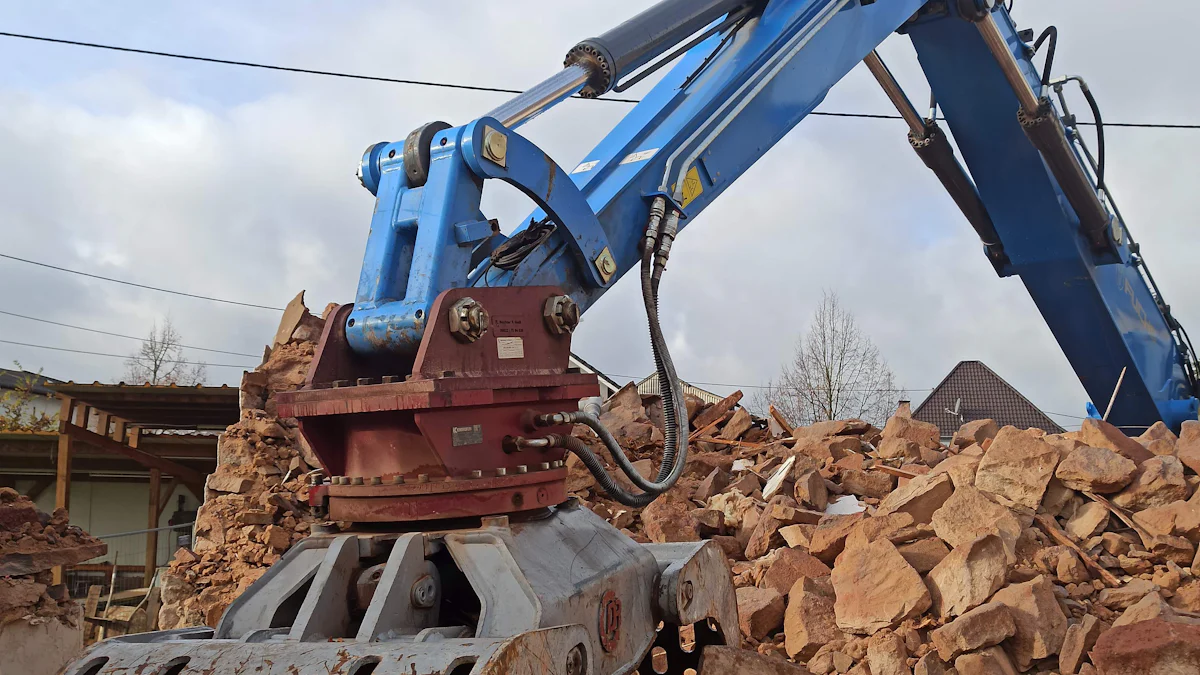
Having the right tools and equipment is essential for diagnosing and repairing issues with your excavator’s ECU. Proper tools not only make the process more efficient but also ensure accurate results, reducing the risk of further damage. Below is a breakdown of the essential and additional equipment you need to handle ECU repairs effectively.
Essential Tools for Diagnosing ECU Issues
To identify problems with your excavator’s ECU, you need diagnostic tools that provide precise readings and insights into the system’s performance. Here are the must-have tools:
Diagnostic scanner or OBD-II tool
A diagnostic scanner or OBD-II tool is indispensable for reading error codes and identifying faults in the ECU. These tools allow you to access real-time data and pinpoint the root cause of issues. Advanced scanners even offer ECU coding capabilities, which are crucial when replacing or resetting the unit. By using this tool, you can save time and avoid guesswork during the diagnostic process.
Multimeter for electrical testing
A multimeter helps you test the electrical circuits connected to the ECU. It measures voltage, resistance, and current, enabling you to detect wiring issues or faulty sensors. This tool is particularly useful for verifying the integrity of the ECU’s power supply and communication lines. Accurate electrical testing ensures that you address the correct problem without unnecessary replacements.
Screwdrivers and basic hand tools
Basic hand tools, such as screwdrivers, are essential for accessing the ECU and its components. These tools help you remove covers, disconnect wiring, and secure replacement parts during repairs. Keeping a set of high-quality hand tools ensures that you can work efficiently without damaging sensitive components.
Additional Equipment for Repairs
Once you diagnose the issue, you may need specialized equipment to carry out the repairs. The following items are highly recommended:
ECU programming software
ECU programming software is vital for updating or reprogramming the unit after repairs. This software allows you to reset error codes, adapt new components, and restore the ECU to its optimal settings. Using the correct programming tools ensures that the repaired ECU functions seamlessly with the excavator’s systems.
Replacement parts (e.g., sensors, wiring)
Faulty sensors or damaged wiring often require replacement to restore the ECU’s functionality. Keeping a stock of high-quality replacement parts ensures that you can complete repairs without delays. Always choose components that are compatible with your excavator model to maintain performance and reliability.
Anti-static gloves and workspace setup
Anti-static gloves protect the ECU from static electricity, which can damage its delicate circuits. A clean and organized workspace further minimizes the risk of contamination or accidental damage during repairs. These precautions ensure that the ECU remains in excellent condition throughout the repair process.
Why Choose YNF Machinery for Excavator Parts
When it comes to sourcing reliable parts for your excavator, YNF Machinery stands out as a trusted partner. With over 35 years of experience, YNF Machinery offers high-quality components that meet the demands of heavy machinery. Their extensive inventory includes sensors, wiring, and other essential parts for ECU repairs.
“YNF Machinery ensures that clients have access to the components they need when they need them.”
By choosing YNF Machinery, you benefit from competitive pricing, rigorous quality inspections, and exceptional customer support. Their user-friendly platform makes it easy to find and order the right parts for your excavator. Whether you’re a contractor, equipment rental company, or excavator owner, YNF Machinery provides the reliability and expertise you need to keep your machines running smoothly.
Step-by-Step Guide to Diagnosing and Repairing ECU Problems
When your excavator’s ECU starts showing signs of malfunction, following a structured approach can save you time and effort. This guide provides clear steps for diagnosing and repairing ECU issues effectively. By using the right tools and techniques, you can restore your equipment’s performance and reliability.
Diagnosing ECU Issues
Accurate diagnosis is the first step in resolving ECU problems. Follow these steps to identify the root cause of the issue:
Step 1: Use a diagnostic scanner to identify error codes
Start by connecting a diagnostic scanner or OBD-II tool to your excavator. This device reads error codes stored in the ECU, providing valuable insights into the problem. For example, codes may indicate sensor failures, wiring issues, or software errors. Tools like those mentioned in the John Deere 30G Excavator Diagnosis and Test Service Technical Manual are designed to simplify this process. Always refer to a troubleshooting guide by fault codes to interpret the results accurately.
Step 2: Inspect wiring and connections for damage
After identifying error codes, visually inspect the wiring and connections linked to the ECU. Look for signs of wear, corrosion, or loose connections. Damaged wiring often disrupts communication between the ECU and other components. A thorough check before starting repairs ensures you address all potential issues.
Step 3: Test sensors and components with a multimeter
Use a multimeter to test the sensors and electrical components connected to the ECU. Measure voltage, resistance, and current to verify their functionality. Faulty sensors or components can cause inaccurate data readings, leading to ECU malfunctions. Testing ensures you pinpoint the exact issue before proceeding with repairs.
Repairing ECU Problems
Once you’ve diagnosed the problem, follow these steps to repair the ECU and restore its functionality:
Step 1: Replace faulty sensors or wiring
Replace any damaged sensors or wiring identified during the diagnosis. Ensure the replacement parts are compatible with your excavator model. High-quality components, like those offered by YNF Machinery, guarantee reliable performance and longevity.
Step 2: Update or reprogram ECU software
Software glitches often require updates or reprogramming to resolve. Use ECU programming software to reset error codes and restore optimal settings. According to Caterpillar’s ECU technical documentation, proper calibration ensures the ECU functions seamlessly with the excavator’s systems. Always follow the manufacturer’s guidelines during this process.
Step 3: Test the ECU after repairs to ensure functionality
After completing the repairs, test the ECU to confirm it operates correctly. Reconnect the diagnostic scanner to check for any remaining error codes. Run the excavator to ensure smooth performance and verify that all systems are functioning as expected.
Safety Tips During Repairs
Working on the ECU requires caution to prevent damage to the unit or injury to yourself. Follow these safety tips during the repair process:
Disconnect the battery before working on the ECU
Always disconnect the excavator’s battery before starting repairs. This step prevents electrical surges that could damage the ECU or other components.
Avoid static discharge to prevent ECU damage
Wear anti-static gloves and work in a clean, static-free environment. Static electricity can harm the ECU’s delicate circuits, so taking precautions is essential.
By following this step-by-step guide, you can diagnose and repair ECU issues with confidence. Regular checks and proper maintenance keep your excavator running efficiently, reducing downtime and extending its lifespan. If you’re interested in enhancing your skills further, consider exploring an ECU repair course or study guide to deepen your understanding of these systems.
Preventive Maintenance Tips for Excavator ECU Longevity

Preventive maintenance plays a crucial role in extending the lifespan of your excavator’s ECU. By following proper maintenance instruction and adopting best practices, you can avoid costly repairs and ensure your machine operates efficiently. Below are actionable tips to help you maintain your ECU and keep your excavator in top condition.
Regular Maintenance Practices
Clean and inspect wiring connections
Dirt and corrosion on wiring connections can disrupt the ECU’s performance. Regularly clean and inspect these connections to ensure proper electrical flow. Use a soft brush or a specialized cleaning solution to remove debris. During inspections, look for frayed wires or loose connections that may require immediate repair. Consistent checks prevent small issues from escalating into major problems.
Update ECU software periodically
Software updates are essential for maintaining the ECU’s functionality. Manufacturers often release updates to improve performance or address known issues. Schedule periodic updates as part of your excavator maintenance routine. Updated software ensures the ECU operates with the latest features and fixes, reducing the risk of glitches or malfunctions.
Monitor engine performance for early signs of issues
Pay close attention to your excavator’s engine performance. Unusual sounds, reduced efficiency, or difficulty starting the machine could indicate ECU problems. Perform regular checks on key systems, such as fuel injection and ignition timing, to detect potential issues early. Monitoring performance allows you to address problems promptly, avoiding costly downtime.
Best Practices for Avoiding ECU Damage
Avoid exposing the ECU to extreme temperatures
Extreme temperatures can damage the ECU’s delicate components. Protect your excavator by parking it in shaded areas during hot weather and using insulated covers in cold conditions. Maintaining a stable operating environment helps prevent overheating or freezing, which can lead to ECU failure.
Use high-quality fuel and lubricants
Low-quality fuel and lubricants can harm your excavator’s engine and ECU. Contaminants in poor-quality fuel may clog sensors or disrupt combustion, affecting the ECU’s ability to regulate performance. Always use high-quality products to ensure smooth operation and prolong the life of your equipment.
Schedule regular professional inspections
Professional inspections at key service intervals are vital for identifying hidden issues. Technicians can perform thorough checks on the ECU and related systems, ensuring everything functions correctly. These inspections provide peace of mind and help you stay ahead of potential problems.
How YNF Machinery Supports Excavator Maintenance
YNF Machinery offers comprehensive solutions to support your excavator maintenance needs. With over 35 years of experience, they provide high-quality parts and expert guidance to keep your equipment running smoothly. Their inventory includes essential components like sensors, wiring, and ECU programming tools, ensuring you have everything needed for preventive maintenance and repair.
“YNF Machinery ensures that clients have access to the components they need when they need them.”
By choosing YNF Machinery, you gain access to reliable products and exceptional customer service. Their expertise in excavator maintenance helps you implement effective preventive measures, reducing downtime and extending the lifespan of your ECU.
When to Seek Professional Help
Knowing when to seek professional help for your excavator’s ECU issues can save you time, money, and frustration. While some problems can be resolved with basic tools and knowledge, others require the expertise of trained technicians. Recognizing the signs that indicate the need for professional assistance ensures your excavator remains reliable and efficient.
Signs You Need Expert Assistance
Persistent error codes despite repairs
If error codes continue to appear even after you have performed repairs, it may indicate a deeper issue within the ECU. Persistent codes often point to complex problems that require advanced diagnostic tools and expertise. Ignoring these codes can lead to further damage and costly downtime.
Complex software or programming issues
Modern excavators rely on sophisticated ECU software to manage their operations. Reprogramming or updating this software can be challenging without the right tools and knowledge. Professional technicians have access to specialized ECU programming software and understand how to calibrate the system for optimal performance. Their expertise ensures the software functions correctly after repairs.
Physical damage to the ECU unit
Physical damage, such as cracks, water exposure, or overheating, can compromise the ECU’s functionality. Attempting to repair a damaged unit without proper training can worsen the problem. Professionals can assess the extent of the damage and determine whether repair or replacement is the best option.
Choosing the Right Professional Service
Look for certified technicians with ECU expertise
Certified technicians possess the training and qualifications needed to handle ECU repairs. Their certification ensures they understand the intricacies of excavator systems and can provide reliable solutions. Always verify a technician’s credentials before entrusting them with your equipment.
Verify experience with excavator-specific ECUs
Not all technicians specialize in excavator ECUs. Choose a service provider with proven experience in repairing and maintaining excavator-specific systems. Their familiarity with your equipment’s unique requirements ensures accurate diagnostics and effective repairs.
Request a detailed diagnosis and repair plan
A professional service should provide a clear diagnosis of the problem and a step-by-step repair plan. This transparency helps you understand the scope of the work and ensures there are no hidden costs. A detailed plan also allows you to make informed decisions about the necessary repairs.
YNF Machinery’s Expertise in Excavator ECU Repair
YNF Machinery stands out as a trusted partner for excavator owners seeking professional ECU repair services. With over 35 years of experience, YNF Machinery has built a reputation for reliability and quality. Their team of experts specializes in excavator-specific ECUs, ensuring precise diagnostics and effective solutions.
“YNF Machinery ensures that clients have access to the components they need when they need them.”
By choosing YNF Machinery, you benefit from their extensive inventory of high-quality parts and their commitment to customer satisfaction. Their expertise in ECU repair helps you minimize downtime and maintain the efficiency of your excavator. Whether you need replacement parts or professional assistance, YNF Machinery provides the support you need to keep your equipment running smoothly.
Understanding and maintaining your excavator’s ECU ensures optimal performance and prevents unexpected issues. Regular maintenance and timely repair keep your equipment efficient, reducing downtime and costly disruptions. By addressing problems early, you extend the lifespan of your machine and enhance its reliability. Explore YNF Machinery for high-quality parts and expert support tailored to your needs. Their trusted service helps you tackle ECU-related challenges effectively. Take the next step—visit their website today or schedule a repair service to keep your excavator running smoothly.
